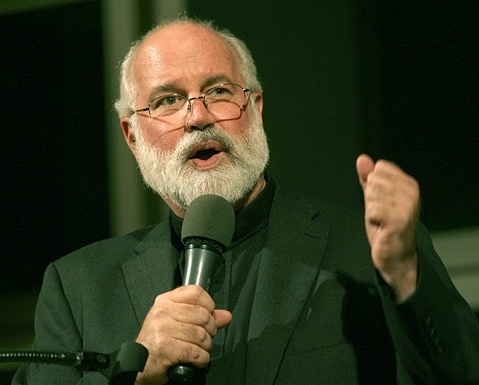Homeboy Industries founder Father Greg Boyle; Las Familias del Pueblo founder Rev. Alice Callaghan; Los Angeles Catholic Worker co-founder Jeff Dietrich; and Skid Row artist and Los Angeles Department of Poverty founder John Malpede today endorsed the citywide ‘Neighborhood Integrity Initiative’ heading for the November ballot in Los Angeles.
This Smart News Release features multimedia. View the full release here: http://www.businesswire.com/news/home/20160128006545/en/

Father Greg Boyle, Founder, Homeboy Industries, has endorsed the Neighborhood Integrity Initiative November 2016 ballot measure in Los Angeles to rein in 'mega' development. Photo Credit: Homeboy Industries
The initiative will halt huge developments not permitted by existing zoning, end City Hall's practice of destroying affordable housing to make way for luxury projects, and force elected leaders to follow the planning laws. It creates a two-year moratorium on all development that tries to go bigger than allowed through “spot rezoning,” bans developers from reducing their required parking, bans developers from writing their own Environmental Impact Reports and forces the City Council to finally update the 1980s-era General Plan framework for how and where growth in L.A. should be allowed.
Father Boyle, whose Homeboy Industries works closely with former convicts and ex-gang members to put them back on track, train them and find them jobs, said in a statement: "There is no more pressing issue for returning citizens than finding affordable housing. The 10,000 former gang members, felons and parolees, wanting to re-direct their lives through Homeboy Industries each year are burdened more than they can bear by a considerably reduced housing stock. This renders them homeless at the precise moment that they are seeking to become productive members of the community. The Neighborhood Integrity Initiative will provide a moratorium on development and therefore a respite for the poor seeking just and fair housing."
Rev. Callaghan, who has worked for years with immigrant families and homeless individuals on Skid Row, using her Las Familias del Pueblo learning center as a hub of family and homeless services, condemned the behavior of Los Angeles City Council members who meet behind closed doors to help developers get around L.A. zoning rules:
“What is the point of building 100 luxury units when, in Pico Union, they're losing 1,000 affordable units?” Callaghan asked. “On Skid Row, in the 1960s, we had 9,000 single room occupancy places for the poor and people getting back on their feet to live. Now we have 3,600 rooms. Where do Mayor Eric Garcetti and the City Council think these people go when another luxury condo goes up? We wonder why so many are on the sidewalks – these are the very people who lived in those single rooms. City leaders can only blame themselves. We've sold our soul to a handful of developers.”
Jeff Dietrich, a founding member of Los Angeles Catholic Worker and author of three books including The Good Samaritan, has worked for decades running the Catholic Worker soup kitchen on Skid Row and offering shelter and care to the ill and frail in a group home near Downtown. Dietrich explained: “It was so enlightening to me to realize — even though I knew it on a broader level — that there's a deep, intimate financial relationship between our L.A. politicians and the developers. I'm so happy we can vote in November to create a civic plan that's really careful about development, and stop the politicians from ignoring the law. … The mayor says he is going to end homelessness by — what was the last date? I can't even remember, because every few years in this city, there is some new push. Let's get that moratorium in place and actually stop and think for a few minutes: 'What are we really doing here?'”
John Malpede decried the frenzy of overdevelopment being approved on and around Skid Row, which is forcing people onto the streets and pushing out artists, to be replaced by those who can pay $3,000 to $4,000 a month in rent. Malpede, a performance artist whose Los Angeles Poverty Department was the first theater in the U.S. created by and for the homeless, praised the Neighborhood Integrity Initiative's requirement that the Los Angeles City Council obey the law by writing a General Plan for how and where Los Angeles should grow. “I wonder, have we forgotten what kind of city we want?” Malpede asked. “We need to have a plan, not driven by what developers think L.A. should be, but about what kind of people we want to be and what kind of community that looks like. It doesn't look like what I see on the streets of L.A.”
View source version on businesswire.com: http://www.businesswire.com/news/home/20160128006545/en/


























